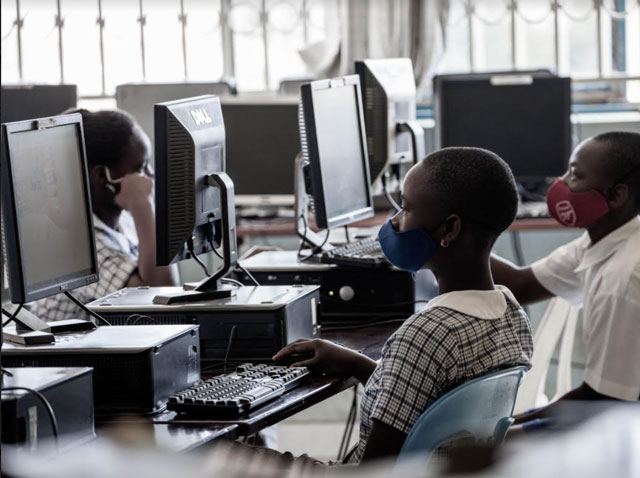
Innovation needs to speed up
FEATURE | EDUCATION | Long before the second wave of the pandemic, questions about the future of education dominated public discourse in Uganda. Shamim Nirere of Izere Education not only had the question lingering on her mind, she found some answers too.
“The future of education will not be about the right answers. We already have education for that. The future will belong to critical thinkers, to creators, to problem solvers, to competent communicators and to solution thinkers,” Nirere says.
Through Izere education, Nirere brings 21st Century education to Ugandan children. She achieves this by imparting critical thinking, leadership, problem-solving skills and communication skills. To her, it is not just a matter of educating children but providing lessons that will be relevant going forward.
These skills are imparted with the aid of resource materials created by Izere Academy. Students have access to 20 courses and a Solution Thinkers Workbook.
Even though Nirere has always looked optimistically to the future because she is solution-oriented, the current climate of uncertainty around education in Uganda is weighing down her spirit.
The education sector in Uganda has suffered since March 2020 when schools were closed in response to the pandemic. Some schools adapted quickly to the new situation through the use of online learning but these were only a handful of schools from the urban centres. A majority of students sat out their school year as they waited on the government. In June 2021, a phased re-opening of schools that had students in upper classes return, was halted when the COVID-19 cases skyrocketed, ushering in the second wave of the pandemic.
Nirere, a teacher, has been providing private lessons to a few students and has watched as parents give up on waiting for schools to reopen. Some parents have taken their children to international schools while some are opting for neighboring Kenyan schools where learning is ongoing.
As an educator and parent, Nirere feels that even when schools open, after 18 months of not studying, many students will have fallen far behind. She says there will be a need for a rehabilitation programme for children even amid the pressure to finish the syllabus.
At the moment, Izere Education is doing its best to keep the learning process going not just among students whose parents are able to pay, but also in low-income communities where the teachers who have been trained and equipped with the solution thinkers workbook take on at least 20 students in a month.
While students in primary, secondary and higher schools of learning have been catered for to the best of the parents’ and schools’ ability through online classes, there is a portion of learners that has barely made it to the conversation: young learners under the age of six years. When schools reopened, the Ministry of Education and Sports said nursery schools would remain closed.
A child growth and development expert, Immaculate Nakanjakko under the umbrella of the Early Years Foundation has been doing the leg work needed to address the plight of learners and stakeholders in this category.
She says, “Majority of children below the age of eight have not gone to school for the past 18 months. While some have been doing online school, there are seven million learners in that age group and only 1500 have been able to access online learning via zoom, according to the data from UNICEF.”
Nakanjakko further says the closure of schools for this period of time has led to problems like the loss of centres for early childhood development and loss of qualified teachers to other countries or industries will remain long after the schools have reopened.
For a system that was already hurting, more damage has been done. The belief is that there could be more illiterate people in future than there are now due to this period where the country has failed to decide on how to move forward. “Anyone who can access the Center for Disease Control Website can see that children are least affected and that the scientific data further shows that children are at a much lower risk for infection than other populations,” she says.
As child growth and development experts, the brunt of their work during this time has been advocacy for practical and fact-based solutions towards the continuity of education for children below the age of six. With various stakeholders in one place, platforms like WhatsApp, zoom and webinars serve the purpose of sharing knowledge, references and materials on the education of children in the early years.
Since April 2021, The Early Years Foundation has been able to train 50 early learning centres in the COVID-19 Standard Operating Procedures and qualified them for clearing. By the time President Museveni put in place a second lockdown, 400 people had been trained.
With these results, the Ministry said it would open the schools in October to enable children to complete their academic year.
The Public Relations officer for the Ministry of Education and Sports Dennis Mugimba says the reopening of schools will be done in a manner that ensures the safety of teachers and learners at all levels.
One of the ways to ensure safety is to vaccinate all teachers with at least one dose of the COVID-19 vaccine before reopening.
To hasten the exercise, the Ministry of Education and Sports (MoES) is working with the Ministry of Health in setting up vaccination centres at various schools. So far, Kampala City Council Authority (KCCA) has set up 10 centres where vaccination is going on and the other districts will follow suit.
Mugimba adds that there will be a phased reopening of schools with the learning happening in shifts to ensure the observation of SOPs especially social distancing.
“We want the public to support us by mobilizing teachers and other staff for vaccination. Our target is to vaccinate 730,000 teaching staff in the whole country,” Mugimba says.
Mugimba says while the MoES is supportive of innovations in the sector, it is interested in supporting innovations that fulfil the mandate of the Ministry and these are innovations that encourage Equity and Equality in Education.
“At the back of innovators’ minds, they should know that we are a country without good internet coverage yet and electricity so any innovation shouldn’t cause a divide due to lack of access to the internet and electricity,” Mugimba says before adding that a calendar has been drawn for reopening schools but implementation is dependent on vaccination.
As the country waits for schools to reopen, The Innovation Village in partnership with The Mastercard Foundation and other stakeholders in the education sector has been holding conversations on how to ensure continuity of learning.
The EdTech Mondays Shows as they are popularly known now, are bringing to light critical conversations on the use of technology for teaching and learning.
Innovation Manager at The Innovation Village, Amanda Liz Tukwasiibwe says the show which has been held on National Television in different countries like Kenya, Rwanda and Nigeria has been imperative in highlighting the gaps, challenges but most importantly the innovations that we as a nation can plug into to solve our current concerns.
With six sessions held so far, the show is enabling the visibility of solutions in technology like the use of online learning platforms and other solutions that can not only enable education to continue but improve it.
Our hope right now is that technology will be used to patch up these gaps and that as these challenges emerge, all stakeholders see the necessity to invest in innovative solutions.
 The Independent Uganda: You get the Truth we Pay the Price
The Independent Uganda: You get the Truth we Pay the Price



